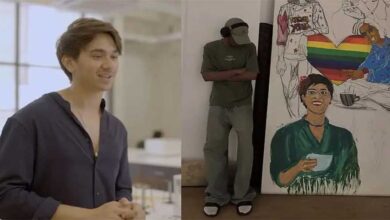A special ‘Cafe Learning Session’ was recently held at Lahore Fort’s Barood Khan featuring renowned artist, educator, human rights activist, and intellectual, Professor Salima Hashmi.
The talk focused on the impact of culture on society and brought together young fine artists, architects, archeologists, conservation scientists, and craftspeople. The session was organized by Aga Khan Cultural Service – Pakistan.
Professor Hashmi shared her long and rich life journey and shared family photographs, revealing the stories behind them. She spoke of her grandfather, Sultan Muhammad Khan, who came from humble beginnings in Sialkot and herded cattle. Due to his deep passion for learning, he would listen to lectures from outside the school window. A teacher took notice of his intellect and eagerness to learn and took him under his wing. This marked the beginning of his educational journey.
Later, while working with an Afghan merchant, he traveled to Kabul, where King Abdur Rahman II appointed him first as a teacher and then as ‘Mir Munshi’ (chief secretary). He later studied at the University of Cambridge, UK, and even served as an ambassador to Queen Victoria at the time.
Chronicling the journey of her father, the legendary poet Faiz Ahmed Faiz, she explained that his mastery over the Arabic language was a product of this rich academic family tradition. While pursuing his education at the Government College University Lahore, Faiz Ahmad Faiz’s father passed away, pulling the family into financial hardship. His poetry, she said, reflected pain, struggle, and poverty.
She also recalled her father’s arrest at Lahore Fort during General Ayub’s regime, where he was imprisoned for nearly three months before being transferred to Lahore Central Jail. During that time, he wrote the poem ‘Aaj Bazaar Mein Pā-ba-Jolān Chalo’. She affirmed that art and literature are inseparable from the events surrounding us.
Professor Hashmi displayed her paintings, which artistically portrayed themes from different eras. She highlighted issues such as Zia-ul-Haq’s censorship, domestic violence, the Kashmir conflict, Palestine’s struggles, and women’s rights through her art. She remarked, “An artist’s role is to celebrate life and raise awareness about social issues.”
One painting titled “Friday Morning” conveyed the message that nature continues on its path regardless of circumstances. She also showed some paintings that she had worked on during her MA program in the US, which portrayed her homesickness.
When dance was banned under Zia-ul-Haq and the arts in general were suppressed, she created a series titled ‘Homage to Love’, which celebrated dance and the instinct for joy. Through this work, she paid homage to her favourite classical dancer Nahid Siddiqui, who was no longer able to perform owing to restrictions brought by Zia’s Martial Law.
Professor Hashmi recounted a powerful memory from Rawalakot, Azad Kashmir, where a school had been destroyed by the disastrous 2005 earthquake. Even though the school had collapsed into rubble, a child would arrive at the destruction site each day and sit on a broken bench as if still eager to learn. That moment deeply moved her, compelling her to express it through a painting.
One of her paintings on Palestine (Gaza) conveyed themes of separation, pain, and devastation. She stated, “The artist must respond to what’s happening in society. It is our social responsibility.” She shared a question she once asked her father, Faiz: “What’s the point of doing all this?” His reply was, “Nothing ever goes to waste.”
She emphasized that any act of goodness, even if done in a single day, is never wasted and expressed hope in the younger generation of women, remarking that the real revolution lies in their increasing presence in universities, where women now outnumber men.







